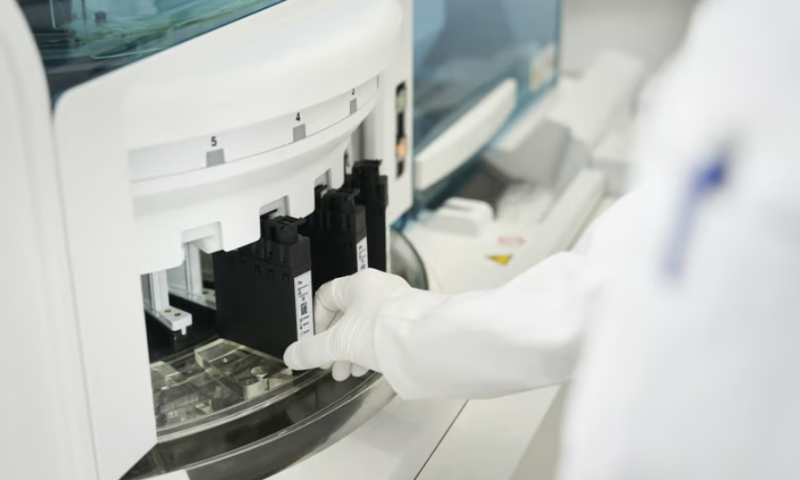Roche is on a roll: For the second time in less than a year, the company has scored FDA clearance for a pair of assays that can be used together to help spot signs of Alzheimer’s disease.
The duo comprises the Elecsys Beta-Amyloid (1-42) CSF II, or Abeta42, and Elecsys Total-Tau CSF, or tTau, assays. The tests can run on any of Roche’s Cobas immunoassay analyzers, and both, as the names suggest, are cerebrospinal fluid assays. They analyze CSF samples to measure the concentration of beta-amyloid and tau proteins, respectively—two biomarkers linked to the development of Alzheimer’s.
The tests’ results are combined into the tTau/Abeta42 ratio, which Roche says can help doctors catch Alzheimer’s in its early stages, since changes in the accumulation of amyloid plaques and tau tangles are among the first biological shifts that occur as Alzheimer’s develops. According to the test-maker, the ratio produces results highly concordant with those of amyloid PET scans.
In this week’s announcement of the duo’s recent FDA 510(k) clearance, Roche said the tTau/Abeta42 ratio tests will be available in the U.S. starting in the fourth quarter of this year. They’re indicated for use in people aged 55 and older who are being evaluated for Alzheimer’s or other potential causes of cognitive impairment. The tests alone aren’t meant to be used to definitively diagnose Alzheimer’s but can be used in tandem with other clinical evaluations to get to that conclusion.
The regulatory nod comes not long after Roche picked up an FDA green light for another pair of CSF tests to help doctors reach an Alzheimer’s diagnosis. That two-test combo, cleared at the end of last year and already available in the U.S., pairs the same Abeta42 test with another tau-spotting Elecsys assay: the Phospho-Tau (181P) CSF test, known as pTau181.
Like the recently cleared pair, these tests and their resulting pTau181/Abeta42 ratio also measure the buildup of the amyloid beta and tau proteins to aid in screening those 55 and over for Alzheimer’s.
As Roche noted in the announcement, not only could the Elecsys assays and their confirmatory approach to screening speed up the often yearslong process of diagnosing Alzheimer’s—since typical methods rely on repeated lab tests and scans to eliminate other possible conditions first and can still result in an inaccurate diagnosis—but they may also offer a less expensive, more widely available alternative to PET imaging, another confirmatory method, with no radiation exposure to boot.
Catching Alzheimer’s earlier and faster means that patients can be prescribed potentially disease-slowing medications in the earliest stages, when they’re typically most effective, Brad Moore, president and CEO of Roche Diagnostics North America, said in the release.
“With the increasing likelihood of broad availability of new, Alzheimer’s disease-specific therapies, now is the time for healthcare professionals and institutions to prepare to meet the demand for diagnostic methods to streamline and accelerate the path to the right treatment, at the right time, for people with Alzheimer’s,” Moore said.
In addition to its CSF tests for Alzheimer’s, Roche is also in the process of developing another assay that would require only a standard blood draw. The Elecsys Amyloid Plasma Panel looks for phosphorylated tau 181 and apolipoprotein e4—or ApoE4, a gene that’s believed to be a major risk factor for the disease—in the blood sample.
Like Roche’s CSF tests, the blood-based panel is meant to be used as a steppingstone toward a diagnosis, albeit one even earlier in the diagnostic pathway, helping identify which patients should undergo confirmatory testing for Alzheimer’s via PET scan or CSF tests.
The test, which Roche is developing with support from Eli Lilly, is already on the FDA’s radar: It earned the agency’s breakthrough designation last summer, potentially speeding up its route to full regulatory clearance.

